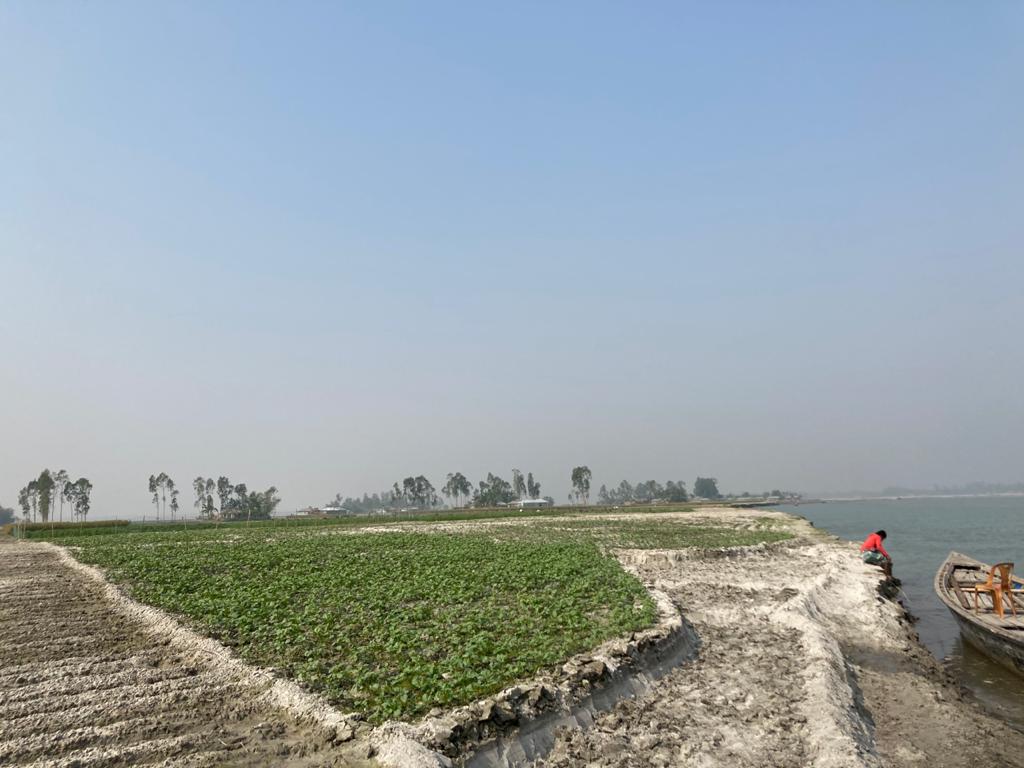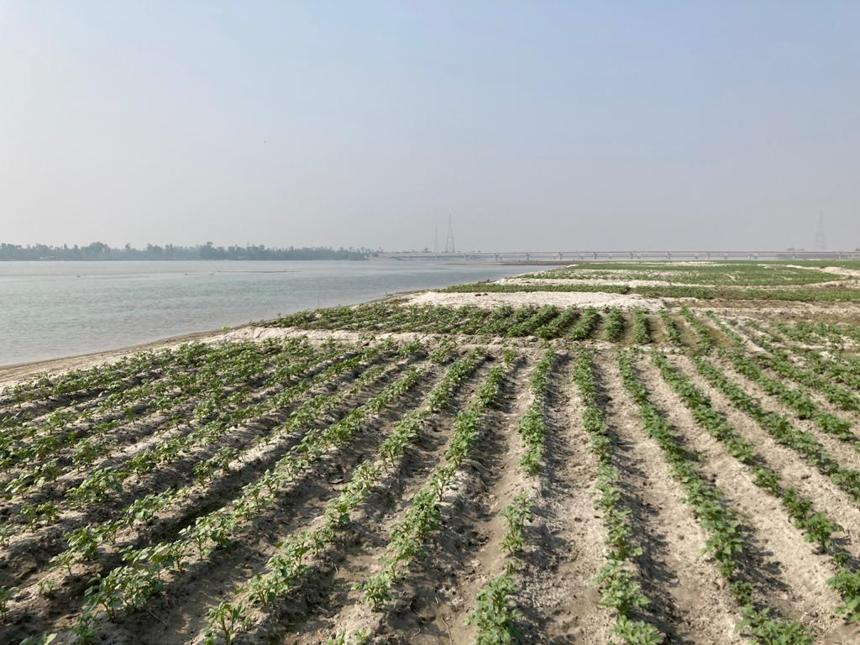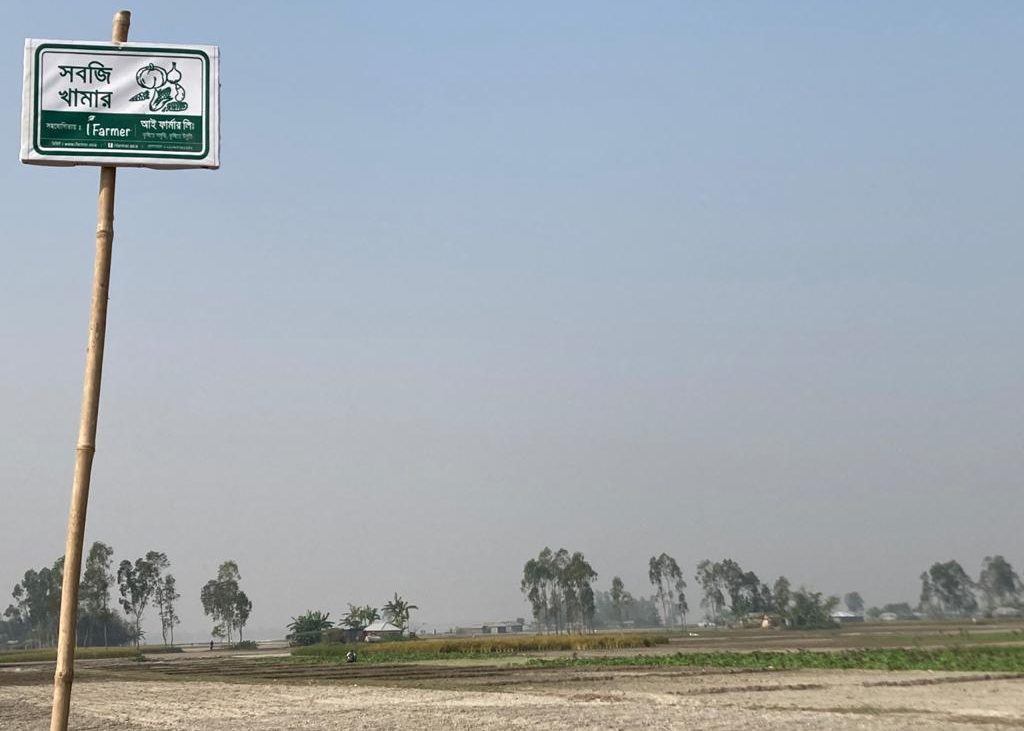
70% of the people who live in the char areas, both coastal and river chars, across Bangladesh rely on agriculture for livelihood. Despite higher reliance on agriculture, farmers in these areas rarely get the facilities mainland farmers enjoy with relative ease.
Md. Motiur Rahman is a farmer who resides in the Teesta-Jamuna char area. After laboring in a foreign country for 13 years, Mr. Rahman returned thinking he could earn equal money working hard in the country. But the lack of support makes it a difficult journey for Mr. Rahman.
His struggle remains a unique one. As Mr. Rahman, who collaborates with iFarmer along with 400 other farmers in the area, puts it: “life is uncertain in this part of the world. Things change fast. You could easily lose your home and livelihood to river erosion in one season and would need to move to the other side of the river on short notice. To add to the challenges, we live in a kind of remote area where it is hard to access many facilities that mainland people could access with relative ease.”
There are over 400 farmers like him in the Teesta-Jamuna char area with tales of hardship.
Nature is not always kind to char farmers. The lives of the people living in riverbeds and riverbanks are the hardest in the country. The river that gives these farmers silt lands also takes away their lives and properties due to river erosion.
As Mr. Rahman says, “there is hardly any respite in char areas. There are good parts of life. But challenges are abundant as well. The biggest challenge of course is river erosion. People are always on the run. Needing to take their homes from one place to another every other day. The second biggest challenge is of course we are remote and can rarely access resources and support that would have made our lives easier.”

I.
There are some 109 char Upazilas in 32 districts across Bangladesh. These coastal and river chars are a defining feature of our landscape. They rise from the riverbeds and are often unstable in the early few years. Largely made up of river deposition, erosion, and re-deposition. In many instances, these chars often disappear as quickly as they appear. The changes due to accretion and erosion in the river systems also change the landscape of the country; making the change a constant part of the lives of the people of these areas. These changes have affected human settlements and the way of life of the people in a myriad of ways in this region, which is well documented and reflected in our songs and literature.
There are two types of chars. One: large, long-established, and settled islands such as Bhola Island, Sandwip, Manpura, Kutubdia, Maheskahi, Sonadia, Char Faizuddin, Char Mantaz, Dublar Char, and Urirchar, etc. Then there are many new ones, for instance, the now-famous Bhasan Char in the Bay of Bengal. Many of these new chars typically remain uninhabited until they are stable and above the normal flood level.
The trials and tribulations faced by the char dwellers are endless and constant. The multi-channel winding river system of the country has historic precedence of changing. Sometimes gradually, eating into well-established villages. And other times suddenly without much prior notice. This constant change in courses of rivers has destroyed many char villages in the past.
II.
Life is not easy in char areas in the country. Many reasons contribute to this reality. A paper created for the Char Livelihood Program (CLP) project comprehensively illustrates this harsh reality: “a fragile physical environment, limited income opportunities, limited assets, remoteness, absence of mainland institutions and services together make char dwellers’ livelihoods particularly vulnerable to extreme poverty and destitution.”
Bangladesh Household Income and Expenditure Survey 2016 reports: “26% of households in the coastal char areas earn less than BDT 7,000 a month, and it is 24.1% of those in the river char areas. Only 21.4% of people living in coastal char areas have access to electricity. Merely 33.6% of the households have proper sanitation in the coastal chars, and 31.3% in the river chars.”
Many areas in the river banks are subject to river erosion. Bogra, Sirajganj, Kurigram, Lalmonirhat, Gaibandha, and Rangpur are some of the most prone areas. Hundreds of families lose their farmlands, homes, properties, etc to the treacherous rivers, every year.

III.
Farmers in these areas face a long list of challenges. There are common ones such as access to finance and high-quality inputs.
Since these people are largely disconnected and suffer from natural calamities routinely, traditional funders rarely show interest.
The second challenge these farmers face is a lack of access to the market. As a result, they often don’t get good prices for their products. Lack of access to knowledge and guidance adds to this long list of burdens making the lives of these people even more difficult.
iFarmer, a Dhaka-based for-profit agri-fin-tech company, has helped solve many of these problems for these farmers. The company has worked with local farmers and communities to find targeted solutions to the challenges that farmers face: issues including improving agriculture production, providing market access support, and helping access finance for farmers.
iFarmer started by providing these farmers with finance and high-quality inputs. Today, it provides a comprehensive suite of solutions to improve the lives of the farmers in the char areas.
Founded in 2018, iFarmer started by addressing the challenge of finance that smallholder farmers face across markets. To date, iFarmer has worked with some 6000 farmers and has done almost $3.5 million of financing to farmers.
iFarmer started working in the Teesta-Jamuna char area not long ago. However, the company has made a tremendous impact within the short period it has worked in the area.
iFarmer provides access to high-quality inputs to these farmers through various partnerships with retailers - more like input as a service to farmers. Farmers don’t need to give iFarmer anything upfront. Instead, they share profit at the end of the season, which makes it easier for the farmers to repay.
iFarmer’s intervention solves both the finance and input challenges for these char farmers who rarely can access formal financing channels.
The second major challenge these farmers face is access to the market. Many of these farmers often rely on middlemen for selling their products that often eat into their profits. To address the challenges, iFarmer has developed access to the market program that helps farmers with access to the market directly and earn good money on their products. iFarmer has built a strong B2B agriculture produce supply business and aims to get into the B2C business in early 2021.
Thus, along with finance and inputs, iFarmer now helps these farmers to access the market directly bypassing middlemen and thus earn a maximum profit on their products. This helps farmers in these areas earn a good return and help eventually improve their lives.
IV.
iFarmer has worked with some 400 farmers over the last year in the Teesta-Jamuna char area. Helped cultivate 2,000 acres of land, and produce 40,000,000 KG potato production by the end of January 2021. The company has helped increase cultivation capacity per farmer by 50-70%. The comprehensive intervention approach of iFarmer has made it possible to address the challenges char farmers face across the country.
According to several estimates, 20 million people live in char areas in Bangladesh. They are some of the most marginal and disadvantaged people in our society. Over the years, the Government in partnership with various development partners has taken several initiatives that are now helping bring some positive changes in these areas.
iFarmer’s approach brings a new dimension to interventions taken to change the lives of the char farmers. The company has designed a comprehensive approach to helping char farmers to improve their productivity, access finance, and get better prices for their products and in the process helping these farmers to improve their lives and create opportunities for others in their communities. Over the past year, iFarmer has achieved meaningful success in working with farmers in the Teesta char area and now looks to expand its work in char areas across the country.
